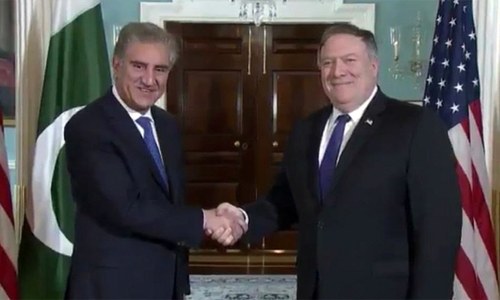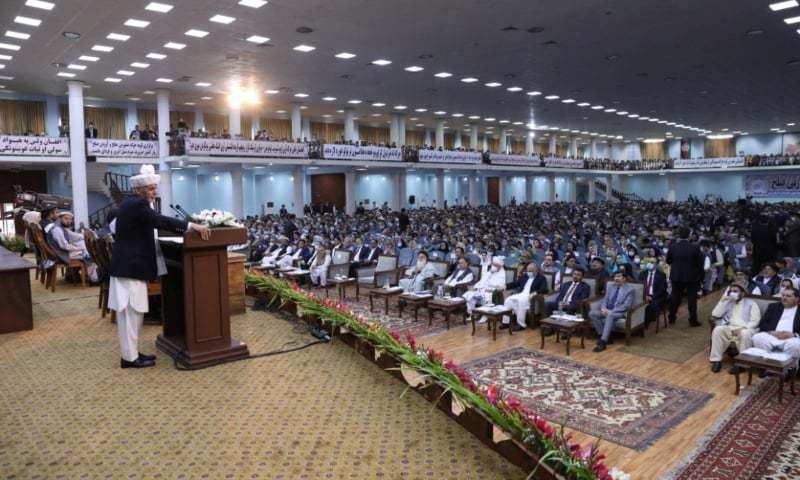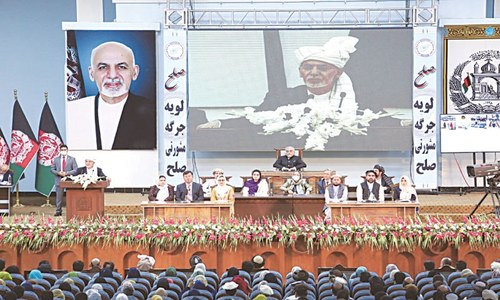A traditional Afghan council concluded on Sunday with hundreds of delegates agreeing to free 400 Taliban members, paving the way for an early start to negotiations between Afghanistan’s warring sides.
The declaration read out in both of Afghanistan’s official languages of Pashto and Farsi calls for an immediate start to negotiations and cease fire. The move looks to bring the United States a little closer to returning its troops and ending its longest military engagement.
No date has been set but negotiations between Kabul’s political leadership and the Taliban are expected to begin as early as next week and will most likely be held in the Middle Eastern state of Qatar, where the Taliban maintains a political office.
The Afghan negotiations were laid out in a peace deal signed by the United States and the Taliban in February. At the time of its signing it was touted as Afghanistan’s best chance at ending decades of war.
Afghan President Ashraf Ghani praised delegates for their decision, urged the Taliban to stop fighting.
Taliban political spokesman Suhail Shaheen said the decision “was a good step, a positive step”. He said negotiations could start within one week of their prisoners being freed.
As for a cease fire, Shaheen said the Taliban was committed to the deal it struck with the United States and according to that deal “the cease fire will be one of the items to be discussed during the intra-Afghan negotiations”.
The council’s decision to free the prisoners does not come as a surprise as delegates were urged by the US at the start of the council, or jirga, on Friday to take “this difficult action” so negotiations could begin to bring an end to the war.
“To remove obstacle, to start peace talks and to stop the bloodshed, the jirga confirms the release of 400 Taliban prisoners,” said Atefa Tayeb, a council secretary who read out the final declaration at the conclusion.
The deal negotiated between the United States and Taliban calls for the government to free 5,000 prisoners and for the Taliban to free 1,000 government and military personnel in its custody as a goodwill gesture ahead of the start of negotiations.
Kabul balked at the release but eventually freed all but the last 400. President Ghani said he was not authorised to free these because of the seriousness of their crimes, and asked for the council to decide instead. He did not detail of what the 400 were accused.
Delegates were therefore given the stark choice of either freeing the prisoners or seeing a war that has killed tens of thousands continue. The delegates said they wanted international guarantees that the Taliban would not return to the battlefield.
Read: Afghan Taliban’s strength
Washington’s Peace envoy Zalmay Khalilzad spent more than a year and a half negotiating the deal with the Taliban to provide for the withdrawal of American soldiers after more than 19 years in Afghanistan.
The withdrawal began earlier this year but roughly 8,600 US soldiers remain in Afghanistan and their return will depend on the Taliban honoring its commitment to fight against other terrorist groups and ensure Afghanistan is not again used to attack the United States or its allies.
The withdrawal of US and Nato troops is not dependent on the success of negotiations between Kabul’s political leadership and the Taliban. But US Secretary of State Mike Pompeo has made it clear that Washington wants a negotiated end to the conflict, including a cease fire.
An attack against a military compound on Saturday that killed seven military personnel and injured another 16 was a reminder that Afghanistan’s war would not be over easily. No one took responsibility for the attack but both the Taliban and Islamic State affiliate is active in the area.
A spike in recent violence in Afghanistan has been mostly attributed to the IS affiliate, whom the Taliban are fighting as are the Afghan government and US forces. Previously a US department of defense official who could not be named because of the sensitivity of the subject said Washington considered IS its biggest threat in Afghanistan and wanted a deal that would recruit the Taliban in a coordinated fight against it.
Pakistan welcomes Afghan council's decision
Meanwhile, the Foreign Office (FO) on Sunday welcomed the council's recommendation to release the remaining 400 prisoners.
"We hope that with [the] implementation of this step [...], as envisaged in the US-Taliban peace agreement, intra-Afghan negotiations will commence at the earliest," a statement by FO spokesperson Zahid Hafeez Chaudhri said.
"Pakistan has repeatedly emphasised that Afghan leaders must seize this historic opportunity and work together constructively through intra-Afghan negotiations to secure a comprehensive, broad-based and inclusive political settlement in Afghanistan.
"The international community must also reinforce its support for the success of intra-Afghan negotiations for sustained and durable peace and stability in Afghanistan," the statement read.
"For its part, Pakistan has consistently supported an Afghan-led and Afghan-owned peace and reconciliation process. Pakistan’s positive contribution to the process is internationally recognised.
"Pakistan reaffirms its support for a peaceful, stable, united, democratic, sovereign and prosperous Afghanistan, at peace with itself and with its neighbours."













































